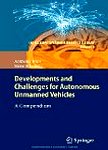版权所有:内蒙古大学图书馆 技术提供:维普资讯• 智图
内蒙古自治区呼和浩特市赛罕区大学西街235号 邮编: 010021

丛 书 名:Intelligent Systems Reference Library
版本说明:2010
I S B N:(纸本) 9783642107030
出 版 社:Springer Berlin Heidelberg
出 版 年:2010年
学科分类:08[工学] 082503[工学-航空宇航制造工程] 0825[工学-航空宇航科学与技术]
摘 要:It is widely anticipated that autonomous vehicles will have a transformational impact on military forces and will play a key role in many future force structures. As a result, many tasks have already been identified that unmanned systems could undertake more readily than humans. However, for this to occur, such systems will need to be agile, versatile, persistent, reliable, survivable and lethal. This will require many of the vehicles cognitive or higher order functions to be more fully developed, whereas to date only the component or physical functions have been successfully automated and deployed. The book draws upon a broad range of others work with a view to providing a product that is greater than the sum of its parts. The discussion is intentionally approached from the perspective of improving understanding rather than providing solutions or drawing firm conclusions. Consequently, researchers reading this book with the hope of uncovering some novel theory or approach to automating an unmanned vehicle will be as disappointed as the capability planner who anticipates a catalogue of technical risks and feasibility options against his favoured list of component technologies and potential applications. Nevertheless, it is hoped that both will at least learn something of the others world and that progress will ensue as a result. For the defence policy and decision maker, this is a must-read book which brings together an important technology summary with a considered analysis of future doctrinal, legal and ethical issues in unmanned and autonomous systems. For research engineers and developers of robotics, this book provides a unique perspective on the implications and consequences of our craft; connecting what we do to the deployment and use of the technology in current and future defence *** Hugh Durrant-Whyte